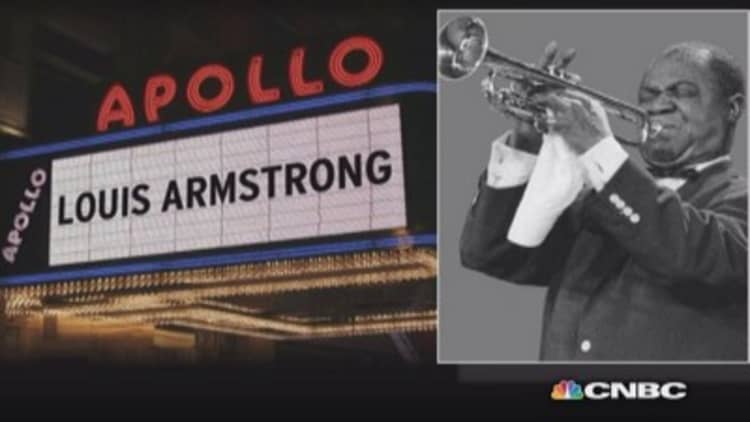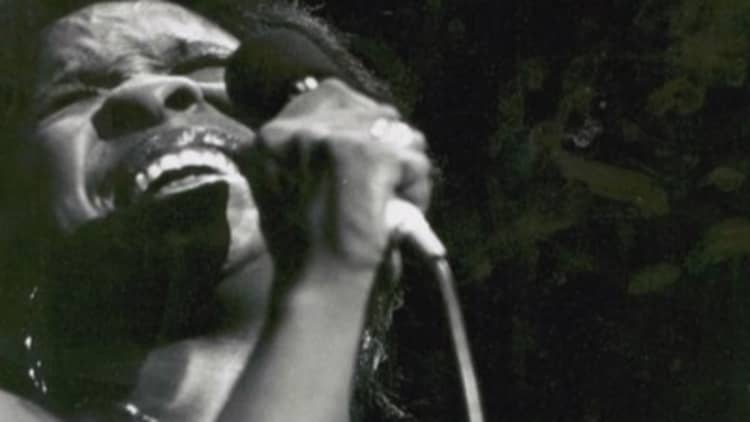
Once a dominant force in American pop culture, the Apollo Theater can still draw a crowd to Harlem's 125th Street.
The famed theater turned 80 this year and celebrated the milestone with a star-studded benefit concert, headlined by Gladys Knight and Natalie Cole. The gala paid tribute to the Apollo's legacy of launching the biggest names in entertainment, from Ella Fitzgerald to Stevie Wonder.
"Almost everybody that was anyone in black music came through the Apollo. You know all of the comedians, all of the musicians, all of the big bands," said T.S. Monk, a jazz musician who watched his father Thelonious Monk perform on the Apollo stage as a child. "I mean, how many places have that kind of history for any genre of music? It's like the Grand Ole Opry."

The theater's claim-to-fame is its long-running talent show "Amateur Night," which premiered the same year the Apollo opened in 1934. It showcases musicians, comedians and dancers hoping to catch their lucky break and is a precursor to other famous talent shows like "Star Search" and "American Idol."
It's a reputation that both exalts and haunts the theater as it attempts to create a new identity in the 21st century.
"Everyone knows the Apollo as the old standard. You know, where stars were born, and legends were made. Ella Fitzgerald to Michael Jackson to Lauryn Hill, they all started here at the Apollo and then grew to become great acts," explained the Apollo Theater Foundation Chairman Dick Parsons. "But we're not a museum. I mean, we can't just live on that past. What we have to do is create a new future."
For the former Time Warner and Citigroup Chairman, shaping the Apollo's new legacy was a challenge he had to accept when asked to lead the venue 15 years ago.
"The Apollo was, when I was growing up, a source of pride for the black community and for Harlem," said the New York native.
When Parsons took the helm, the theater was a struggling non-profit that was failing to introduce new art forms or discover new acts. He said he believed revamping the programming was crucial to driving contributions and support from the philanthropic community. However, the 1500-seat theater's money woes ran deep and started well before the theater was acquired by New York State in 1991.
Entertainment lawyer-turned-Apollo Theater CEO Jonelle Procope points to integration after the Civil Rights era and the growing popularity of large arenas with upending the venue's rental business model.
"A lot of the musical acts that we had depended on no longer needed to be here or had the desire to be here, and there was a lot of competition," revealed Procope, who was personally tapped by Parsons to run the theater in 2003. "So, the theater ... fell on hard times and went into bankruptcy."
In order to resuscitate the theater, the two quickly began enlisting all-star advisers to its board of directors, including billionaire investor Ron Perelman and renowned music producer Quincy Jones. With their financial support and guidance, the theater was able to turn around its finances and carry out a multi-million dollar renovation.
Visitors will now not only see a new marquee and new stage, but also feel the difference when attending a performance.
"Five years ago, in January, we replaced all of the seats," laughed Procope, "which believe me, was a big deal, because, the seats had been in the theater since 1934."
The Apollo appears to be in a good position to reclaim its place in pop culture. Currently, it entertains over 100,000 people a year, and it boasts a $13 million annual operating budget with 35 percent of its revenues generated from ticket sales.
The rest is from contributions. The theater has also raised $10 million to fund a slate of new programming it hopes will connect with a younger audience.
"We're no longer just a concert venue; but really a global performing arts venue, and that's what I see when I think of the future," explained Procope. "For example, we premiered something called 'Get on the Good Foot.' It was a celebration of James Brown and dance in the fall. And we also have Music Café, which is an opportunity for young artists who are working outside of the mainstream to perform."
The theater's momentum wasn't lost on guests attending the anniversary gala, as they contributed $2.3 million to its fund.This is a record for the annual fundraiser, which is now in its ninth year.
For veterans of its stage, no matter how much things change for the venue, the Apollo will always be considered home.
"We're blessed to go to so many places now and to be all over the world; but when you come somewhere that you have so much history and so much joy and experiences, that it's just always good to set foot," remarked Grammy Award-winning singer Gladys Knight, who performed standards made popular by Lena Horne and Ella Fitzgerald at the gala.
Will the theater live to see another 80 years in entertainment? Comedian and the gala's host Wayne Brady thinks so.
"As long as there's talent, there should be an Apollo."





